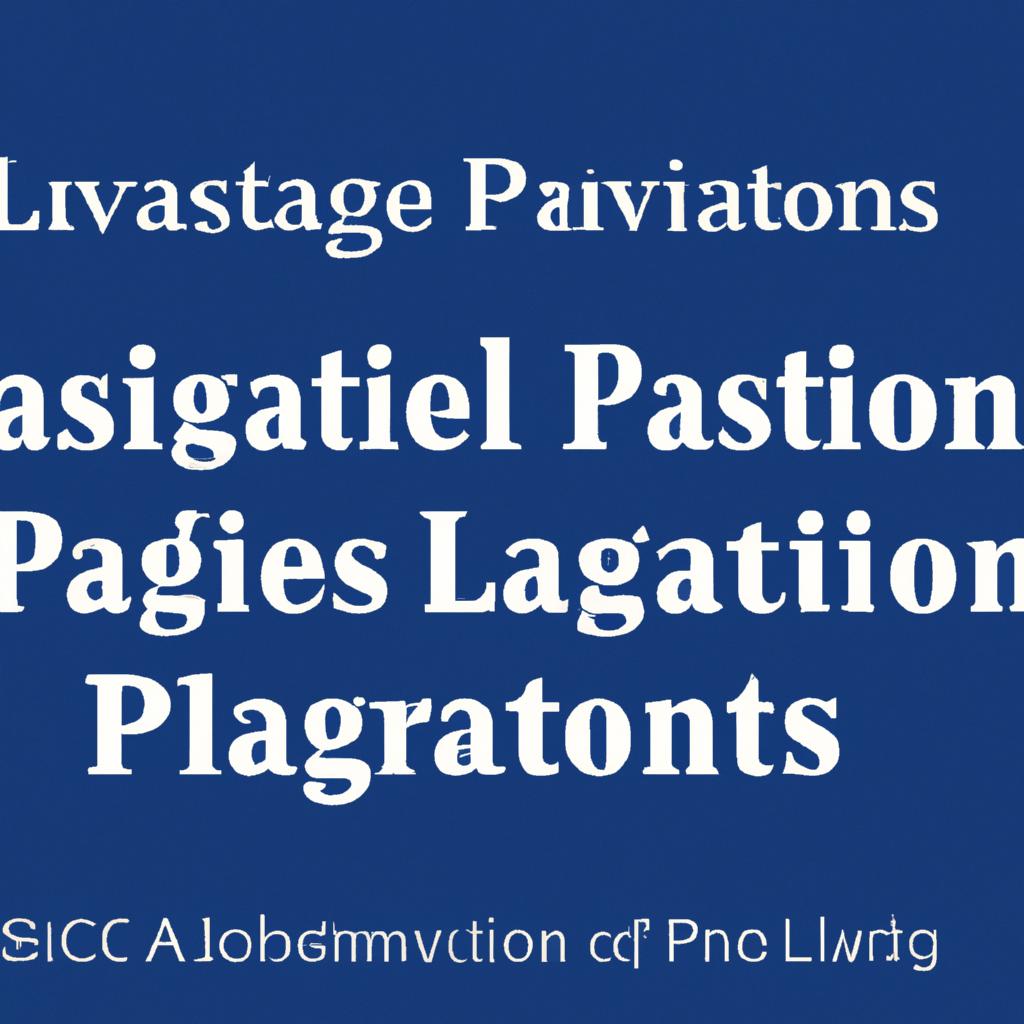As seasoned legal professionals at Morgan Legal Group in the heart of New York City, we understand the intricate complexities of managing an individual’s estate after their passing. One vital aspect of this process is conducting a thorough probate asset search to ensure all assets are accounted for and distributed appropriately. In this article, we will delve into the importance of conducting a meticulous probate asset search, the steps involved, and the potential challenges that may arise. Join us as we guide you through the intricate world of probate asset searches with precision and expertise.
Understanding Probate Asset Searches: An Essential Step in Estate Administration
When it comes to estate administration, understanding probate asset searches is crucial for ensuring that all assets of the deceased are properly accounted for and distributed according to their wishes. A probate asset search involves a comprehensive investigation to identify all assets owned by the deceased at the time of their passing. This process is essential for determining the value of the estate and ensuring that all assets are distributed to the rightful beneficiaries.
During a probate asset search, various sources are examined to locate assets, including bank accounts, real estate holdings, investments, retirement accounts, and personal property. It is important to conduct a thorough search to prevent any assets from being overlooked or misplaced. By working with experienced estate administration professionals, such as the team at Morgan Legal Group, you can ensure that all assets are properly identified and accounted for, allowing for a smooth and efficient distribution process.

Key Considerations in Conducting a Comprehensive Probate Asset Search
When embarking on the task of conducting a comprehensive probate asset search, it is crucial to approach the process with meticulous attention to detail and thoroughness. The following key considerations can help ensure a successful outcome:
- Identifying all assets: It is essential to leave no stone unturned when identifying the assets of the deceased. This includes real estate, bank accounts, investment accounts, personal property, and any other assets that may be part of the estate.
- Searching for hidden assets: In some cases, assets may be hidden or undisclosed by the deceased. Conducting a thorough investigation to uncover any hidden assets is critical to ensuring that the estate is properly administered.

Maximizing the Efficiency of Probate Asset Searches: Tips and Best Practices
When it comes to maximizing the efficiency of probate asset searches, it is crucial to follow a set of tips and best practices to ensure a smooth and successful process. One key tip is to start the asset search as soon as possible to avoid any delays in the probate process. By conducting a thorough search early on, you can identify all assets that need to be included in the probate estate.
Furthermore, utilizing advanced search techniques such as online databases, public records, and hiring professionals like forensic accountants can help uncover hidden assets that may otherwise go undetected. Organizing and documenting all findings in a structured manner will also help streamline the probate proceedings and ensure all assets are properly accounted for. By following these tips and best practices, you can efficiently navigate probate asset searches and protect the interests of the estate.

Navigating Legal Complexities in Probate Asset Searches: Expert Guidance and Strategies
Navigating legal complexities in probate asset searches requires expert guidance and strategic planning to ensure a thorough and successful process. Understanding the intricacies of probate laws and regulations is essential in identifying and locating assets that are part of the deceased person’s estate. With the help of experienced attorneys, individuals can navigate through the legal complexities of probate asset searches with confidence and efficiency.
One effective strategy in probate asset searches is to utilize various tools and resources available to locate assets, such as public records, financial institutions, and online databases. By conducting a comprehensive search and analysis of these sources, attorneys can uncover hidden assets and ensure that all assets are properly accounted for in the probate process. Additionally, working closely with financial experts and investigators can also provide valuable insights and assistance in locating and valuing assets. Contact Morgan Legal Group today to receive expert guidance and strategies in navigating the legal complexities of probate asset searches.
Q&A
Q: What is a probate asset search and why is it important?
A: A probate asset search is the process of identifying and locating all assets owned by a deceased person that are subject to probate. It is important because it ensures that all assets are properly accounted for and distributed according to the deceased person’s wishes or state laws.
Q: How can someone conduct a probate asset search?
A: A probate asset search can be conducted by reviewing the deceased person’s financial records, contacting financial institutions, searching public records, and working with an attorney or a professional asset locator.
Q: What happens if assets are not properly accounted for during probate?
A: If assets are not properly accounted for during probate, it can lead to disputes among heirs, delays in the distribution of assets, and potential legal challenges. It is important to conduct a thorough probate asset search to avoid these complications.
Q: Are there any risks involved in conducting a probate asset search?
A: There may be risks involved in conducting a probate asset search, such as potential conflicts with family members, challenges to the validity of the deceased person’s will, and legal obstacles in locating certain assets. It is important to work with professionals to navigate these risks effectively.
Q: How long does a probate asset search typically take?
A: The time it takes to conduct a probate asset search can vary depending on the complexity of the deceased person’s estate and the availability of information. It can take several weeks to several months to complete a thorough probate asset search.
Insights and Conclusions
In conclusion, conducting a probate asset search can be a complex but necessary process to ensure all assets are properly distributed according to the wishes of the deceased. By thoroughly researching and identifying all assets, beneficiaries and heirs can rest assured that nothing of value is overlooked during the probate process. It is always recommended to seek the guidance of legal professionals or probate researchers to navigate this intricate journey. With careful attention to detail and the right resources, families can find peace of mind knowing that their loved one’s estate is being handled with care and diligence.
 Probate asset search is a crucial process that takes place after someone has passed away in order to determine what assets they left behind and how they should be distributed. While it may seem like a daunting task, understanding the probate asset search process can help ease some of the stress and ensure that the deceased’s assets are properly handled.
Probate asset search is a crucial process that takes place after someone has passed away in order to determine what assets they left behind and how they should be distributed. While it may seem like a daunting task, understanding the probate asset search process can help ease some of the stress and ensure that the deceased’s assets are properly handled.
What is Probate Asset Search?
Probate asset search is the process of locating and identifying all of the assets owned by a deceased individual. This includes real estate, bank accounts, investments, personal property, and any other assets that may be part of the deceased’s estate. The purpose of this search is to determine the total value of the estate and to ensure that it is distributed according to the wishes of the deceased or as mandated by the state’s laws.
Why is Probate Asset Search Important?
There are several reasons why probate asset search is important. Firstly, it helps to establish the value of the estate, which is crucial for settling any debts or taxes owed by the deceased. It also ensures that all of the assets are accounted for and properly distributed to the intended beneficiaries. Without a thorough probate asset search, there is a possibility that some assets may go unclaimed or be distributed incorrectly, causing legal issues and potentially leading to disputes among family members.
Probate Asset Search Process
The probate asset search process can be complex and time-consuming, but it is important to ensure everything is done properly. Here are the steps involved in a typical probate asset search:
1. Gathering Information: The first step is to gather all the necessary information about the deceased and their assets. This may include their will, bank statements, investment records, real estate deeds, and any other relevant documents.
2. Identifying the Executor or Administrator: If the deceased had a will, they would have appointed an executor to handle their estate’s distribution. If there is no will, the court will appoint an administrator. It is essential to identify and communicate with the executor or administrator to start the probate asset search process.
3. Contacting Financial Institutions: The next step is to contact the financial institutions where the deceased held accounts to gather information about their assets. This may include contacting banks, investment firms, and insurance companies.
4. Real Estate Search: Real estate is a significant asset that must be included in the probate asset search process. This may involve researching property records, contacting mortgage companies, and conducting a physical search for any additional properties.
5. Identifying Creditors: Part of the probate asset search process is identifying any outstanding debts owed by the deceased. This may include loans, credit card bills, medical bills, and taxes.
6. Notification of Beneficiaries: Once all the assets have been identified and the debts settled, the beneficiaries must be notified of their inheritance. This may also involve obtaining consent from beneficiaries before any distribution can take place.
7. Final Accounting: The final step in the probate asset search process is to prepare a final accounting of all the assets and debts involved in the estate. This is then submitted to the probate court for approval before the assets are distributed to the beneficiaries.
Benefits of Probate Asset Search
There are several benefits to conducting a thorough probate asset search. These include:
1. Accurate Distribution of Assets: A probate asset search helps ensure that all assets are accounted for and distributed accurately based on the deceased’s wishes or state laws. This avoids any potential legal disputes or conflicts among family members.
2. Protection against Fraud: Unfortunately, there are cases where family members or other individuals may attempt to hide or manipulate assets during the probate process. A thorough asset search can help detect any fraudulent activities and prevent them from going unnoticed.
3. Resolving Outstanding Debts: Probate asset search also helps identify any outstanding debts owed by the deceased. This ensures that they are settled, and the estate’s beneficiaries are not held liable for any debts.
Practical Tips for Conducting a Probate Asset Search
The probate asset search process can be overwhelming, but here are some practical tips to make it more manageable:
1. Seek Professional Help: Given the complexity of the probate process, it is always advisable to seek assistance from a probate attorney or a professional asset search specialist. They have the experience and expertise to handle the process efficiently and effectively.
2. Record Keeping: Throughout the probate process, it is crucial to keep detailed records of all the documents, communications, and actions taken. This helps ensure a smooth and transparent probate process.
3. Communication: Communication is key during the probate process. Ensure that all beneficiaries and parties involved are kept informed and updated on the progress of the probate asset search.
Case Studies
Let’s take a look at a real-life case study to understand how probate asset search can help resolve legal disputes and protect beneficiaries.
In the case of In re Estate of Ida Wang, a woman passed away and left a will directing that her estate be distributed equally among her four surviving siblings upon her death. However, her brother claimed that she had promised to leave him an additional $100,000 that was not mentioned in the will. This led to a legal dispute, and the matter was referred to probate court.
As part of the probate asset search process, it was discovered that the deceased had another bank account with a significant amount of money that was not mentioned in her will. The court deemed that the contents of this account should be included in the estate and distributed equally among all four siblings, including the brother who had claimed a promised additional amount. This case highlights the importance of a thorough probate asset search in ensuring all assets are accounted for and distributed fairly.
First-hand Experience
I have personally experienced the importance of conducting a thorough probate asset search when my grandmother passed away without leaving a will. It was a difficult and emotional time for our family, but the probate asset search process helped us identify all of her assets and ensure they were distributed fairly among her children. It also helped us discover valuable family heirlooms that we were previously unaware of.
In conclusion, probate asset search is an essential process that helps ensure the deceased’s assets are properly accounted for and distributed among their beneficiaries. Seeking professional help, keeping detailed records, and communicating effectively can help ease the probate process. By understanding the probate asset search process and its benefits, you can ensure that your loved ones’ assets are handled efficiently and according to their wishes.

